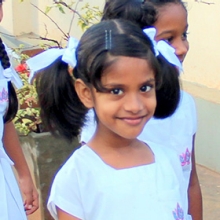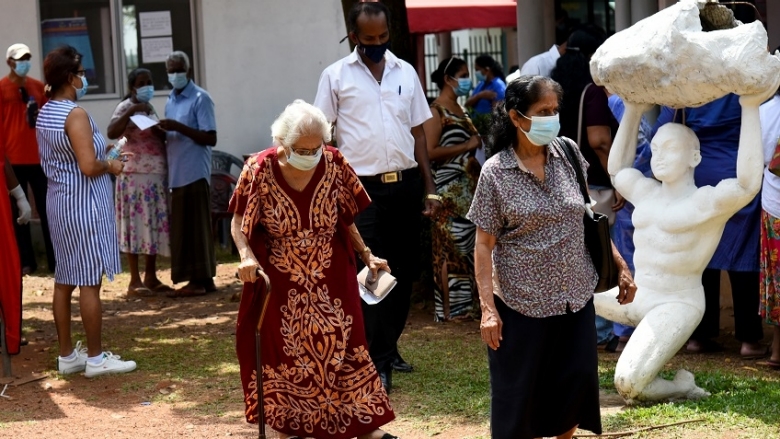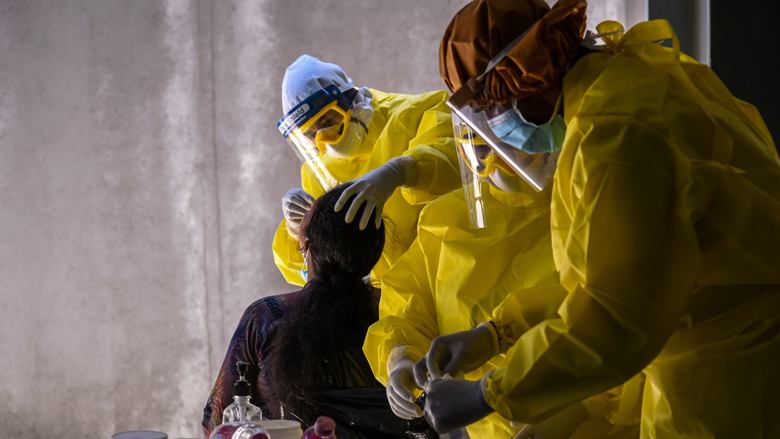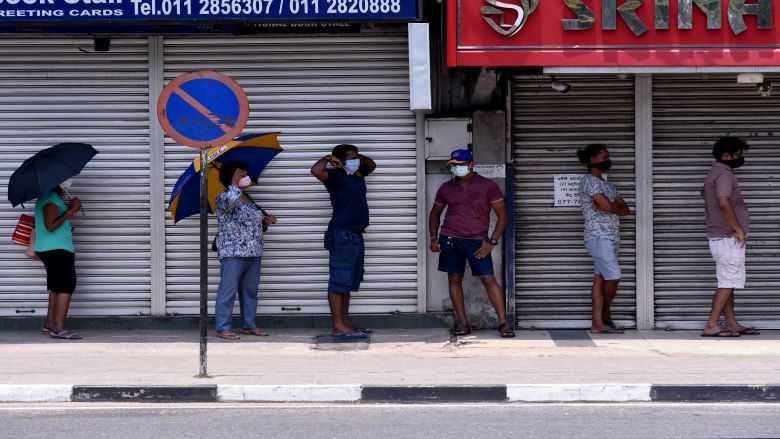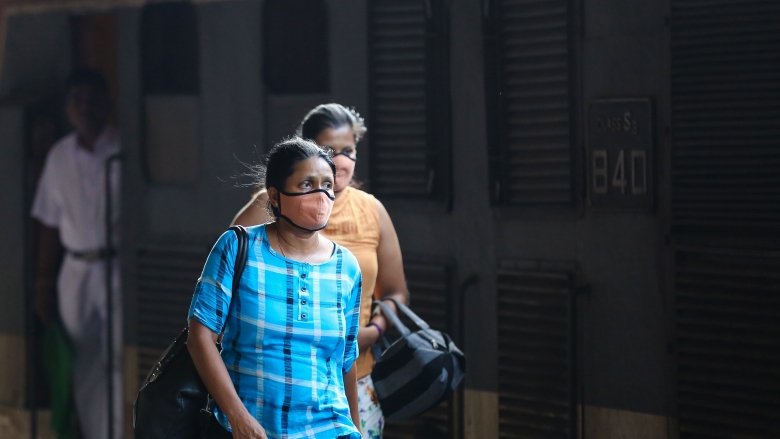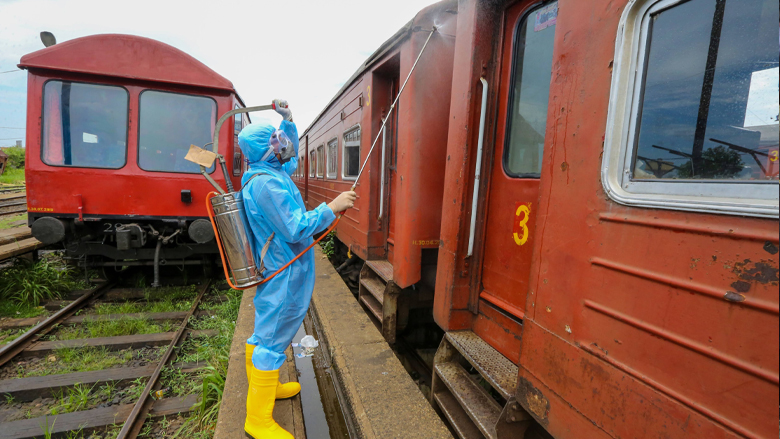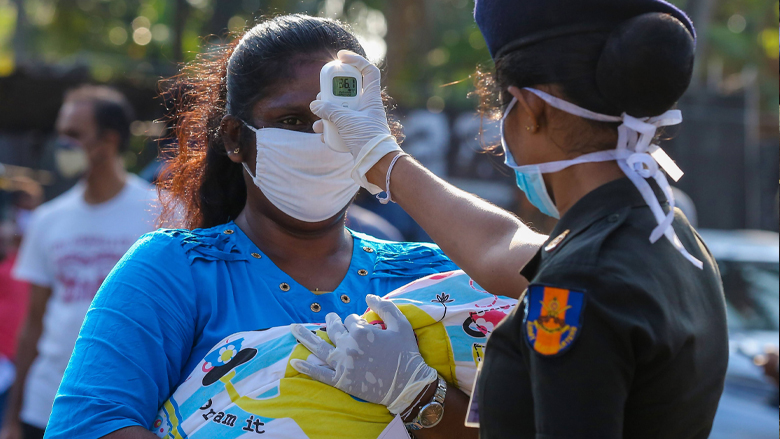Overview
The World Bank Group, one of the largest sources of funding and knowledge for developing countries, is taking broad, fast action to help developing countries strengthen their pandemic response. In Sri Lanka, the Bank is working with the Government to implement pandemic management and prevention measures, and to protect vulnerable communities from the impacts of the pandemic. The $128.6 million Sri Lanka COVID-19 Emergency Response and Health System Preparedness Project (ERHSP) which came into operation in May 2020 has supported the implementation of Sri Lanka’s ‘test, track, isolate and treat strategy’ by contributing to the provision of essential supplies and services. An additional financing of $88.97 million was approved to provide scaled-up social protection measures to vulnerable communities, and two further additional financings of $80.5 million and $100 million were approved in April and September 2021 respectively to support vaccine procurement and deployment.
In addition, in September 2020, funds worth $56 million were also reallocated to pandemic related assistance from existing projects, with $17 million from the Local Development Support Project (LDSP), $15 million from the General Education Modernization Project (GEMP), $9 million from the Sri Lanka Primary Healthcare System Strengthening Project (PHSSP) and $15 million from the Climate Smart Irrigated Agriculture Project (CSIAP).
The ERHSP with a total of $398.07 million has contributed to Sri Lanka’s pandemic management and prevention efforts by:
1. Supporting emergency response measures
project focus was on emergency response measures, and on supporting the Ministry of Health (MoH) with urgent healthcare priorities and pandemic management and prevention measures including quarantining and contact tracing. Project funds have contributed to the provision of essential works, goods, services and consultancies for emergency pandemic management and prevention activities, including the procurement of medical and surgical consumables and PPEs. Project funds have been used to:
- Procure 400,000 PCR test kits, 1.5 million Rapid Antigen Test kits, 1.12 million PPEs and necessary biomedical equipment for hospitals.
- Establish over 60 intermediate care centers with isolation facilities and initiate health system preparedness for a future pandemic by strengthening six hospitals to function as mini Infectious Disease Hospitals at the provincial level.
- Provide facilities, and medical and non-medical equipment to quarantine centers, and support necessary renovations.
- Procure 26 cabs and 805 motorbikes to be used by MoH/PHIs and 50 ambulances and 2,087 scooters to be used by PHMWs in carrying out public health activities.
· Supply 87 intensive care units (ICU) and high dependency units (HDU) to increase the national capacity of ICU/HDU beds to 650.
· Procure 120 high-flow nasal oxygen therapy units, 25 ICU ventilators, 7 neonatal ventilators, 20 transport ventilators and 2,100 oxygen concentrators. The procurement of 7 oxygen-generating plants is in progress.
2. Providing social protection and support to vulnerable communities
The social protection component of the ERHSP supported vulnerable populations during the pandemic and interventions under this subcomponent have supported 3.1 million cash transfer beneficiaries and in-kind transfers have been provided to 417,427 beneficiaries.
3. Establishing health sector preparedness and pandemic prevention measures
Since late 2020, the project has gradually begun to shift focus from emergency activities, and has initiated the implementation of several short-term health sector preparedness and long-term pandemic prevention measures. Work is underway to expand the isolation and case management capacity around the country, and two hospitals are being strengthened to function as mini Infectious Disease Hospitals (IDH). The project has also contributed to increasing the national capacity of ICU/HDU beds to 650.
Laboratory quality development activities have been initiated to increase and improve the testing and diagnostic capacity in the country. In addition to procuring laboratory equipment, the project is in the process of establishing a networked laboratory information system for secondary and tertiary care hospitals.
4.Strengthening routine public healthcare services
An additional grant of US$ 1.7 million provided by the Pandemic Emergency Financing Facility (PEF) has supplemented ongoing efforts to strengthen national systems for pandemic response and public health preparedness. These funds were used to support the continuation of routine health services at community health centers. PEF funding has helped strengthen mental health support services provided through the public health sector. Funds were used to expand and adapt mental health services as required in the pandemic context, to conduct mental health promotion activities, develop IEC material, strengthen the toll free mental health helpline, and to support facility and capacity development at the National Institute for Mental Health. PEF resources were also used to strengthen programs for the prevention of gender-based violence (GBV), and to create awareness on the public services available to victims of GBV. The grant also supported the strengthening of the national and regional communicable disease surveillance system. PEF funds were used to introduce an online disease notification system linked to the existing e-surveillance system, and to provide the necessary IT hardware capacity to hospitals and MOH offices in all districts. This funding also contributed to the scale up of risk communication efforts, supporting the development of more nuanced communication strategies and public information on preventive measures.
5. Supporting the procurement and deployment of COVID-19 vaccines
Two additional financings to the ERHSP were approved in April and September 2021, to purchase and deploy safe and effective COVID-19 vaccines that meet the World Bank’s Vaccine Approval Criteria, to strengthen relevant health systems that are necessary for successful deployment, and to prepare for the future.
Since the detection of the first confirmed COVID-19 case in early 2020 Sri Lanka has been relatively successful in its pandemic management efforts. The World Bank has remained responsive to the country’s healthcare priorities, and while continuing to support emergency needs, the ERHSP has now initiated several medium and long term preparedness measures to ensure that Sri Lanka’s public healthcare system is better placed to face the future.
Last Updated: Apr 07, 2022


